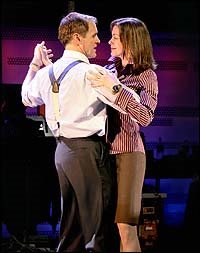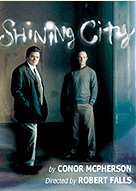
"Druid Synge" Gerald W. Lynch Theatre at John Jay College, part of the 2006 Lincoln Center Festival. July 23, 2006
I just sat through one-third of "Druid Synge" after a friend called. His companion for this marathon of all of John Millington Synge's plays wasn't going to make it past the supper break. This 8.5 hour theatrical event is a production by the Irish troupe, Druid Theatre Company, under the direction of Garry Hynes. I enjoyed the evening, but two Irish plays back-to-back were plenty for me.
The six plays presented were:
- Riders to the Sea
- The Tinker's Wedding
- The Well of the Saints
- The Shadow of the Glen
- The Playboy of the Western World
- Dierdre of the Sorrows
In "Playboy, " the play opens in the 1800's in a tavern of sorts run by Pegeen. Her father, Michael, and his two drinking buddies , Philly and Jimmy, are headed to a wake, encouraging the young man, Shawn, who wants to marry Pegeen to join them. Shawn is trying to live a clean and proper lifestyle, rather than become yet another drunken Irishman. Amid this, it is revealed that there is a fugitive about who has killed his father. Pegeen is at first shocked, but when Christopher appears at the tavern looking for shelter, she is smitten. As Christopher tells his tale, time and time again, its legendary qualities grow. Soon the entire village is enthralled with the brave young man who stood up to a tyrannical father. Also in the market for a husband is the Widow Quin, who stops by to attempt her claim on the boy, accompanied by three villagers, Honor, Sara and Susan. This trio treat Christopher like a movie star idol, complete with screams of adoration. Pegeen rejects Shawn and promises to marry Christopher. It's not long into Act II that the not-so-dead father shows up to take his whiny and wimpy son home. Christopher now believes his own story of his courage and stands up, replaying the scene from when he thought he killed the man the first time. Since this occurs in the presence of the entire village, Christopher is now rejected and shunned as a murderer by Pegeen and the rest of the village. Widow Quin again makes a play to help when yet again, the not-so-dead father appears. At this point, Christopher has had enough and turns the tables, becoming the tyrant in the relationship.
As Pegeen, Catherine Walsh carries much of the weight of this play. Her Pegeen is typically fiery Irish. Derry Power as her father Michael displays the stereotypical drunken Irishman, with just a hint of Alfred Doolittle tossed in. Marie Mullen, who appears in 5 of the 6 plays is a scheming and self-serving Widow Quin. She balances the nurturing of a mother figure for Christopher with a woman pursuing her own sexual interests without letting it get creepy. As Christopher, Aaron Monaghan has a real actor's workout, physically and emotionally. Even when Christopher is revealed as a fraud, the audience still cares about what brought him to do the things he's done.
As dark as all of this sounds, it was all quite funny. Director Garry Hynes uses a deft hand to broaden the appeal of these very specifically Irish characters.
In "Deirdre," the setting is much darker, approaching a bloody Shakespearean quality. Set in an ancient Ireland, Conor is an older local king who has identified and groomed Deirdre to become his wife. Fiery and red-headed (yeah, go ahead and think Maureen O'Hara), Deirdre only knows that she's been locked away from the world since childhood and is ready for that to end. What follows is a combination of themes from Romeo and Juliet, Hamlet and Macbeth. Deirdre has met a young soldier, with whom she escapes on the eve of her wedding to Conor. This has incited war. Seven years later, Conor makes overtures of peace to reconcile the land. Double-crosses prevail and the stage ends littered with bodies.
As Deirdre, Gemma Reeves brings a striking appearance, but her red hair doesn't have quite enough fire to make her Deirdre anything more than just interesting. Mick Lally as Conor attempts a few Claudius-like moments but ultimately ends up as Lear. As Naisi, Deirdre's soldier-husband, Richard Flood is a most handsome knight in shining armor, eager and passionate to save Deirdre from her fate. When Deirdre has figured out that there is no way to escape Conor's final plot, she tells Naisi basically "we had a good run, let's end it while we can still remember how much we loved each other." That should be a gut-wrenching and tear-inducing moment, but with Ms. Reeves it's only kind of sad. Mr. Monaghan also appears in this play, but I couldn't tell what he was supposed to be at first. His initial entrance was through a window, wearing only plaid pants, torn off just below the knee. He crept about the stage, making me wonder whether he was supposed to be a cat or a monkey (or Mr Peepers, a la Chris Kattan from SNL). Only in the second act do we learn that he is indeed human and also in love with Deirdre. (He waits seven years to cut his own throat after yet another rejection of him to run off with Naisi.)
The set design by Francis O'Connor, which consisted primarily of a dirt floor stage and worn plaster walls worked pretty well for these two plays, but the loose dirt getting kicked around became very distracting for me. Costumes by Kathy Strachen were serviceable for "Playboy" but a little more interesting if not as successful for "Deirdre." With the latter, there was a rather odd mix of contemporary clothing and an ancient traditional gown, along with a couple of kilts, some military coats that looked like design rejects from Elton John's "Aida" and an dress coat/robe that might have belonged to Idi Amin.
This production moves next to the Guthrie Theatre in Minnesota.





